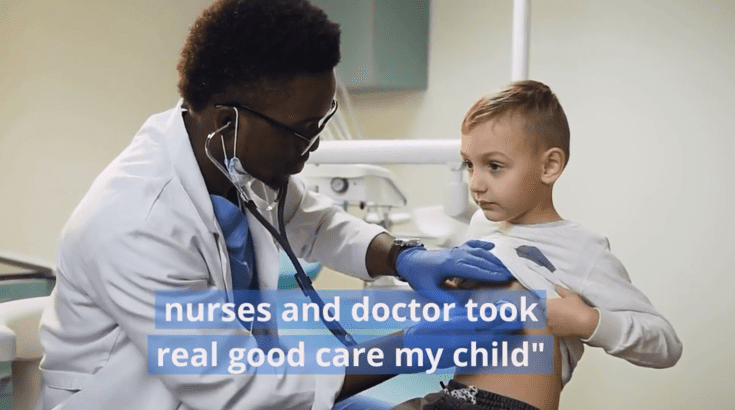Empathy is the ability to understand and share the feelings of others, a trait that goes beyond medical expertise. In pediatric healthcare, empathy plays a crucial role in the doctor’s ability to connect with their young patients and families, creating an environment where children feel safe, understood, and cared for.
Empathy in pediatrics fosters trust and clearer communication and reduces the anxiety of children in medical settings. In this comprehensive look, we at Omega Pediatrics will dive into how empathy in pediatrics directly impacts the quality of caring for young patients.
Further, Omega Pediatrics will explore how empathetic interactions enhance doctor-patient relationships, improve clinical outcomes, and contribute to positive healthcare experiences. Empathy isn’t just an admirable quality in pediatricians—it’s a fundamental part of their success in delivering effective, compassionate care.
Why Empathy in Pediatric Healthcare Matters
Empathy in pediatric care isn’t merely about kindness; it’s a clinical tool that significantly influences how effectively doctors diagnose, treat, and manage the health of their young patients. Pediatricians must address the child’s complex needs and those of their family members, who may have anxieties, questions, and concerns.
Children experience healthcare differently than adults. They may not fully understand why they are at the doctor’s office or feeling unwell. For a pediatrician, understanding the emotional and psychological context of a child’s fear or discomfort is as important as diagnosing the physical symptoms. Empathy in pediatrics alleviates some discomfort, enhances cooperation, reduces resistance to exams or treatments, and fosters positive attitudes toward healthcare.
Indeed, empathy in pediatrics can’t be stressed enough. From this perspective, we at Omega Pediatrics find it important to emphasize empathy in pediatric practice as we provide compassionate care for our young patients.
The Benefits of Empathy on Clinical Outcomes
Empathy in healthcare has been linked to improved patient outcomes across many areas. According to research, when pediatricians show empathy, children and families are likely to communicate openly about symptoms, follow through with treatment plans, and trust the medical advice they receive. Empathy in pediatrics, and we at Omega Pediatrics, in particular, have shown to:
- Increase cooperation during medical examinations and procedures, such as vaccinations.
- Reduce anxiety and fear, which lowers stress levels for the child and parent.
- Enhance satisfaction and trust between the family and healthcare provider, creating a more comfortable environment.
These outcomes benefit patients’ experiences and contribute to more effective clinical care, as doctors have better access to accurate information, influencing their diagnosis and treatment.
The Science Behind Empathy in Pediatric Care
Empathy is a deeply human characteristic with roots in psychology and biology. Neurobiological studies show that empathy is associated with activity in certain brain regions, suggesting that humans are naturally wired to connect with and understand one another’s emotions.
This inherent trait is cultivated and strengthened, allowing pediatricians to use it as a powerful tool in their medical practice. Empathy in pediatrics enables doctors to interpret children’s behavior and communication, especially when kids may not fully understand or articulate their symptoms.
Young patients express themselves through body language, facial expressions, and tone, which an empathetic pediatrician interprets more effectively. When empathy in pediatrics is actively practiced, doctors enhance their ability to pick up on these subtle cues, enabling them to tailor their care based on each child’s needs. Empathy in pediatrics supports more precise diagnoses and encourages children and parents to open up, improving the quality and accuracy of the information exchanged.
1. Empathy as a Key to Building Trust in Pediatric Relationships
Trust is essential in any healthcare relationship, but it’s important in pediatrics, where parents and children feel safe and understood. Empathy in pediatric care fosters a connection that allows open, honest communication, building a foundation of trust. This relationship is crucial, as children feel hesitant to visit the doctor, especially if they’ve had a negative experience.
How Empathy Strengthens Trust
Empathy in pediatric care means taking time to listen without judgment, answering questions thoroughly, and validating the child’s and family’s emotions. These behaviors demonstrate respect, encouraging families to feel comfortable discussing concerns. When parents and children know that their pediatrician genuinely cares about their feelings and fears, they’re more likely to:
- Follow medical advice without hesitation.
- Communicate openly about symptoms or concerns, even when they’re sensitive or embarrassing.
- Seek care proactively, knowing their worries will be met with understanding.
Establishing Trust with the Child
Trust is important for the child’s experience, as many fear medical settings. Empathy in pediatric patients breaks down these barriers, showing children that the doctor’s office is a safe space. Pediatricians engage at the child’s level, use language the child understands, and respond to their emotions. Empathy sets the stage for a positive experience.
2. Empathy and Effective Communication: The Key to Quality Care
Effective communication is at the heart of empathy in pediatric care. For pediatricians, communicating well means listening actively, explaining in simple terms, and adapting their approach based on each child’s and family’s needs. This empathetic communication allows clearer explanations of medical conditions.
Active Listening as a Tool for Empathy in Pediatrics
Active listening is one of the primary ways pediatricians demonstrate empathy. This involves more than just hearing words; it includes understanding non-verbal cues and responding thoughtfully. Pediatricians create an environment where families feel comfortable sharing their concerns without feeling rushed or dismissed. Active listening also helps pediatricians capture important details that influence diagnosis or treatment decisions.
For example, a pediatrician might notice that a child is quiet or hesitant. By asking questions and validating the child’s feelings, the physician learns valuable information that could impact their care. Indeed, empathy in pediatrics encourages children to be more open, leading to better understanding and a more accurate treatment plan.
Bridging Communication Gaps
Empathy in pediatric practice bridges communication gaps between pediatricians, children, and parents. Medical terminology can be intimidating, and without clear explanations, parents may have misunderstandings about their child’s care. Pediatricians recognize this and adapt their language to ensure families fully understand.
They take time to explain medical terms, offer visual aids, or provide examples, ensuring that parents feel confident and informed. Clear communication through empathy empowers families and promotes a stronger doctor-family relationship, which positively impacts long-term health outcomes.
3. Empathy Reduces Anxiety in Pediatric Settings
Medical visits can be a source of anxiety for children, especially when they involve procedures such as vaccinations or blood draws. Pediatricians who show empathy mitigate this anxiety by creating a supportive environment that feels less clinical and more comforting.
Techniques for Reducing Anxiety with Empathy
- Offering Reassurance: Pediatricians offer gentle reassurance by acknowledging the child’s fear and explaining what to expect in a calming way.
- Using Distraction Techniques: Empathetic pediatricians use distractions, such as storytelling or showing pictures, to help the child focus on something positive.
- Allowing Familiar Comforts: Pediatricians encourage children to bring a favorite toy or allow a parent to hold their hand during procedures, providing comfort through familiar objects or loved ones.
Reducing a child’s anxiety makes the visit smoother and improves the child’s perception of medical settings. Empathy, therefore, has long-term benefits, as children who feel less anxious in healthcare settings are more likely to seek medical help when they need it in the future.
The Impact of Empathy on Pediatrician: Professional Fulfillment and Reduced Burnout
While empathy benefits young patients and their families, it also supports the well-being of pediatricians. Working with children and families can be challenging, and empathy allows pediatricians to find a sense of purpose and fulfillment in their roles. Here’s how empathy positively impacts pediatricians:
Greater Job Satisfaction and Reduced Burnout
Pediatricians who engage with their patients empathetically experience higher job satisfaction. This is partly because empathy brings pediatricians closer to the emotional rewards of their work, such as seeing a child feel safe or witnessing the relief on a parent’s face after a concerning issue is resolved. These positive experiences help pediatricians feel that their work is meaningful, reducing the risk of burnout.
Reduced Burnout in High-Stress Situations
The emotional demands of pediatric care can be intense. Empathy acts as a buffer against burnout, especially in high-stress scenarios such as treating children with chronic illnesses or managing complex diagnoses. Maintaining a compassionate outlook and staying connected to their patients’ experiences, pediatricians maintain a sense of balance and purpose. They develop resilience, which helps them cope with the stresses of their profession.
This mindset allows pediatricians to approach each case with renewed energy, even in difficult circumstances, preserving their mental and emotional health. Empathy encourages pediatricians to approach challenges as opportunities to help, reducing feelings of frustration or fatigue. Over time, this positive outlook contributes to better mental health and a lower likelihood of burnout, ensuring they can continue to provide high-quality care.
Empathy as a Skill to Be Cultivated
Though some people may have a natural inclination toward empathy, it’s a skill that can be cultivated and strengthened. Pediatricians develop empathy through training programs, mindfulness practices, and seeking regular feedback. These skills enhance their professional abilities and support their mental and emotional health.
Recognizing Empathy in Your Pediatrician: What Parents Should Look For
In a nutshell, parents can find an empathetic pediatrician who can make a world of difference in their child’s healthcare experience. Here are a few ways parents can recognize this crucial trait in their child’s pediatrician:

- Listens Without Rushing: The pediatrician listens attentively without making the family feel rushed. They take time to answer questions thoughtfully and avoid cutting parents or children off mid-sentence.
- Engages the Child: The pediatrician speaks directly to the child using age-appropriate language and gentle interactions, making the child feel included and respected. This demonstrates an understanding of the child’s perspective.
- Acknowledges Fears and Emotions: The pediatrician acknowledges and validates the child’s and parents’ fears or anxieties. They take time to address these concerns, making the family feel seen and heard. This displays a compassionate approach that helps everyone feel valued.
- Shows Patience with Thoughtful Communication: The pediatrician shows patience, even when children are nervous or uncooperative. They understand that medical settings can be intimidating and take extra steps to create a welcoming environment. They take time to explain medical information clearly to ensure families fully understand and feel empowered in the healthcare process.
Indeed, empathy transforms pediatric care into a partnership between the physician, the child, and the family, which ultimately leads to more positive health outcomes.
How Empathy in Pediatric Care Benefits Society
The effects of empathy extend beyond individual doctor-patient relationships, impacting society on a larger scale. When pediatricians practice empathy, they contribute to a culture of trust in healthcare. Children who grow up with positive medical experiences are more likely to continue seeking healthcare as adults, taking proactive steps to maintain their health. This proactive approach benefits society, as healthier individuals contribute to stronger communities.
Empathy in pediatric care also promotes mental and emotional well-being, helping children develop positive associations with healthcare settings. As these children grow, they carry these attitudes, supporting healthier habits and reducing fears or stigmas around medical care. Empathetic pediatricians are helping build a future where individuals feel more connected to and invested in their health, ultimately leading to stronger, healthier communities.
Find an Empathetic Pediatrician for Your Child’s Healthcare
Empathy isn’t just a nice quality in pediatricians—it’s essential to effective, compassionate pediatric care. By actively practicing empathy, pediatricians build trust, reduce anxiety, and improve communication, fostering a supportive healthcare experience for children and their families.
The importance of empathy in pediatric care is clear, from its positive effects on clinical outcomes to the comfort it brings to anxious young patients. Empathy supports the emotional well-being of pediatricians as well, allowing them to find fulfillment and manage the unique demands of their work.
For families, choosing a pediatrician who practices empathy means selecting a healthcare partner who genuinely cares about their child’s health and happiness. Empathy is a powerful tool in the hands of a compassionate pediatrician, one that truly enhances the quality and experience of pediatric healthcare.
Find out more about choosing the best pediatrician for your little ones in this article: Top 10 Things That Make a Good Pediatrician







